Ukraine prisoners of war released under Minsk ceasefire agreement
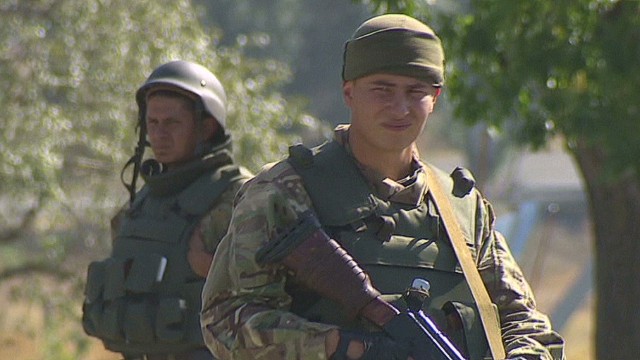 Twenty Ukrainian prisoners of war have been released under the
ceasefire between Kiev and pro-Russian rebels signed in Minsk, Belarus,
last week, Ukraine's President Petro Poroshenko said Monday.
Twenty Ukrainian prisoners of war have been released under the
ceasefire between Kiev and pro-Russian rebels signed in Minsk, Belarus,
last week, Ukraine's President Petro Poroshenko said Monday.
Ukraine's
counterterrorist operation press office said the freed prisoners were
Ukrainian troops, telling CNN they had been exchanged for a "terrorist."
Speaking in the port city
of Mariupol, south of Donetsk, Poroshenko said 33 Ukrainian servicemen
who had refused to surrender had also been able to leave the conflict
zone.
The Russian state news agency ITAR-Tass quoted the vice premier of the self-proclaimed Donetsk People's Republic, Andrei Purgin, as saying both sides had agreed to exchange "30 for 30" prisoners as a starting point.
Russia's RIA Novosti government news agency quoted DPR Prime Minister Alexander Zakharchenko as saying 28 servicemen had been handed over Sunday.
"It (the prisoner swap)
takes place every day. Yesterday we handed over 28 captives and received
even more in return," it quoted him as saying.
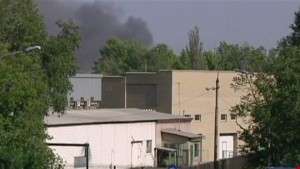
Will Ukraine ceasefire hold?
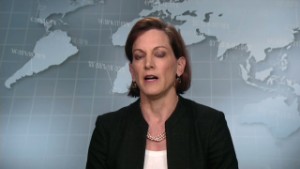
Applebaum: Russia is winning in Ukraine
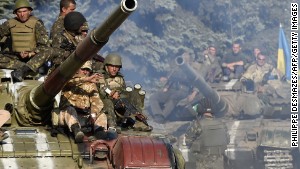
Ceasefire in Ukraine takes effect
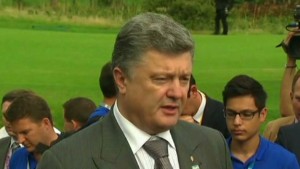
Poroshenko: Roadmap to peace
Ukrainian National
Security and Defense Council spokesman Col. Andriy Lysenko said Ukraine
had determined the whereabouts of more than 100 troops and efforts were
being made to bring them home. He said the exact number of hostages was
unknown.
'We know our enemy well'
The fledgling truce
between the Ukrainian government and pro-Russian rebels began Friday
evening, though both sides were already accusing each other of violating
it by Saturday.
Lysenko accused militants of trying to provoke Ukrainian forces in order to blame Kiev for violations.
Poroshenko expressed hope the truce would hold.
"I believe that the efforts of diplomats will be successful," he told military and border forces.
But the Ukrainian leader warned that the country should not be caught
off guard: "We know our enemy well. We know the price of his words. I've
got no illusions about our opponent, but I've got hope."
The Kremlin issued a statement
saying that Russian President Vladimir Putin had spoken by phone with
Poroshenko on Monday. "The leaders continued to discuss steps to
facilitate the peaceful settlement of the situation in southeast
Ukraine. The dialogue will be continued," it said.
In spite of the ceasefire agreement, Putin remains under pressure from the West over Russia's actions in Ukraine.
The Ukrainian government
and the West accuse Moscow of supporting the rebels with weapons and
fighters -- allegations that Moscow has repeatedly denied.
EU announces new sanctions
Hours after the truce
went into effect, European Union leaders meeting in Belgium agreed on a
new round of economic sanctions against Russia.
On Monday evening, the president of the European Council, Herman Van Rompuy, announced it had adopted "further restrictive measures against Russia."
"The sanctions aim at
promoting a change of course in Russia's actions destabilising eastern
Ukraine and come in the wake of the European Council of 30 August, which
condemned the increasing inflows of fighters and weapons from the
territory of the Russian Federation into Eastern Ukraine and the
aggression by Russian armed forces on Ukrainian soil," he said in a
statement.
The measures will take force once they have been published in the Official Journal of the European Union.
"This will leave time
for an assessment of the implementation of the cease-fire agreement and
the peace plan. Depending on the situation on the ground, the EU stands
ready to review the agreed sanctions in whole or in part," the statement
said.
After Friday's sanctions announcement, the Russian Ministry of Foreign Affairs said Russia "will not fail to retaliate if such measures are adopted."
"The EU would be better
off supporting Donbas' economic revival and bringing normalcy back to
the region instead of frantically seeking to put more strain on Russian
and its own economies," it said. Donbas refers to a southeastern region
of Ukraine encompassing Donetsk and Luhansk.
Mariupol
Poroshenko told staff at a metal works in Mariupol that Ukrainian forces would fight to ensure the city remained part of Ukraine.
"As commander in chief, I
have commanded to ensure the defense of Mariupol and the regime of high
combat readiness. Ukrainian militaries managed to stop tank attacks on
Mariupol by which the enemy tried to ensure the passage to the Crimea,"
he said.
Mariupol is a strategic port city, lying between the Russian mainland and Crimea, which Russia annexed earlier this year.
Poroshenko said that
Ukraine needed financial and technical assistance and was confident that
enhanced cooperation with NATO would help facilitate that.
"NATO managed to reach
an agreement with several countries on direct supply of state-of-the-art
weapons that will help us defend ourselves and win."
Ceasefire deaths
Sporadic artillery and
machine gun fire rang out in the early hours of Sunday on the outskirts
of Mariupol. A gas station was set on fire, and cars carried wounded
civilians down the roads.
Shelling and explosions
were also heard near the airport of the flashpoint city of Donetsk on
Sunday morning, the city council said on its website.
In both cities, the source of the weapons fire wasn't immediately clear.
The Mariupol city
government said that pro-Russian rebels had carried out the shelling
near the city overnight. It said one woman was killed and three people
wounded.
Poroshenko on Monday confirmed that one civilian had died in the city, as well as a Ukrainian soldier in Stanytsia-Luhanska.
The OSCE Special Monitoring Mission to Ukraine said its monitors also witnessed the shooting of a civilian
in a car trying to cross a bridge at the Shchastya checkpoint from the
direction of Luhansk on Saturday. The victim was a father traveling with
his daughter and her mother, it said.
ITAR-Tass late Saturday
quoted rebel officials as saying that Ukrainian forces continued to
shell Donetsk and rebel positions near Mariupol. RIA Novosti reported
that four Donetsk residents were killed in the shelling.
'So much confusion'
Ukrainian forces and
pro-Russian rebels have been locked in vicious fighting in eastern
Ukraine since April, leaving more than 2,200 people dead, according to
the United Nations.
The conflict has
triggered a humanitarian crisis in the region, where shelling has
destroyed homes and infrastructure. Nationwide, more than a million
people have been displaced from their homes by the fighting, most of
them in the East.
Ukrainian forces and the
rebels have engaged in fierce fighting over the past week in the
territory between the Russian border and Mariupol.
A previous unilateral ceasefire declared by the Ukrainian government in June broke down after 10 days.
Amnesty International, meanwhile, accused Ukrainian militias and rebels of carrying out war crimes. The human rights group singled out Russia for a buildup of armor and artillery in eastern Ukraine.
Putin has voiced
sympathy for the rebels, many of whom are ethnic Russians. But he denies
that Russia has armed and trained the rebels, or sent its troops over
the border.










0 comments:
Post a Comment